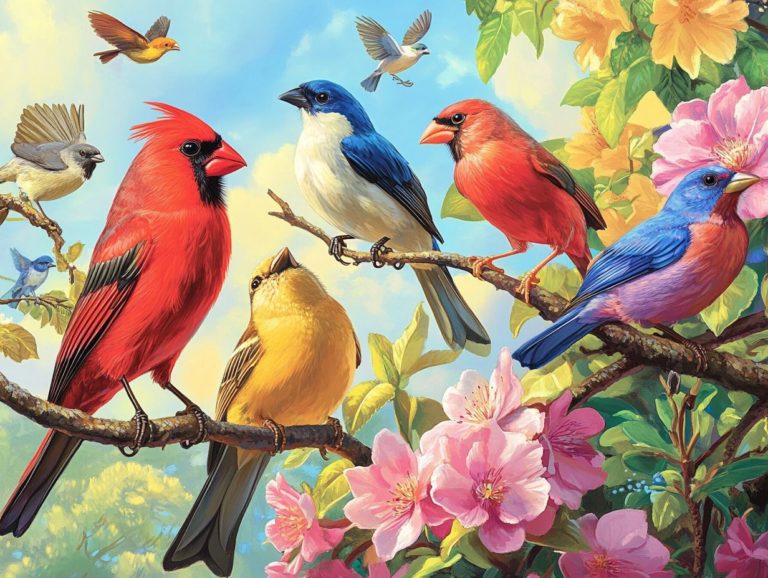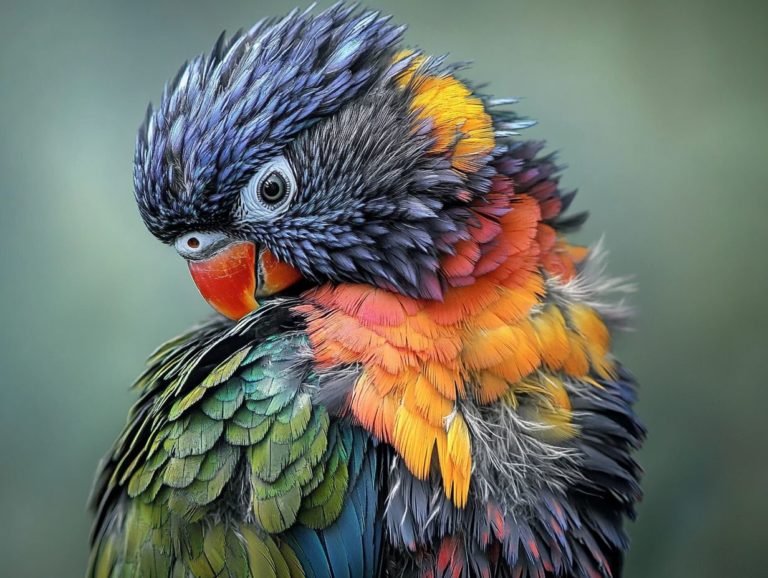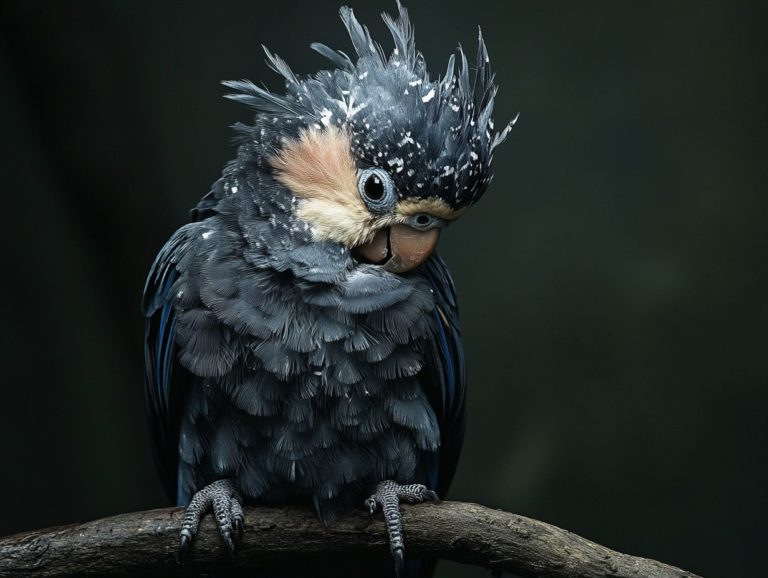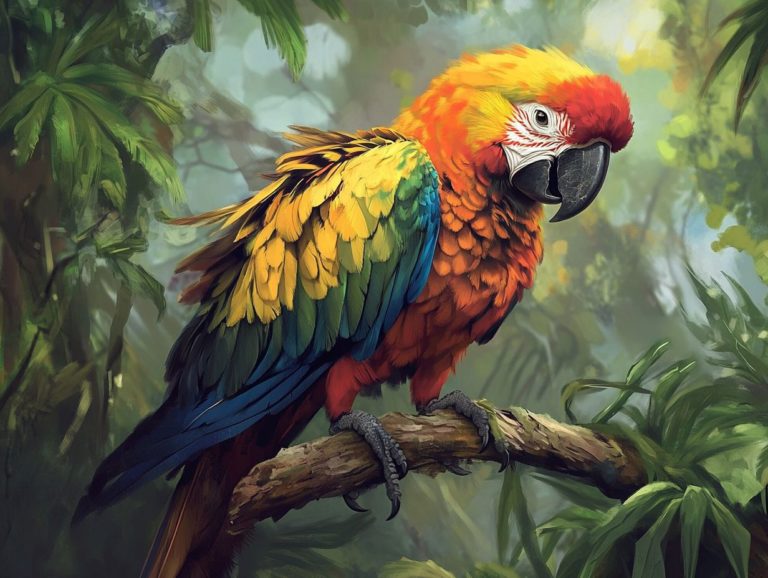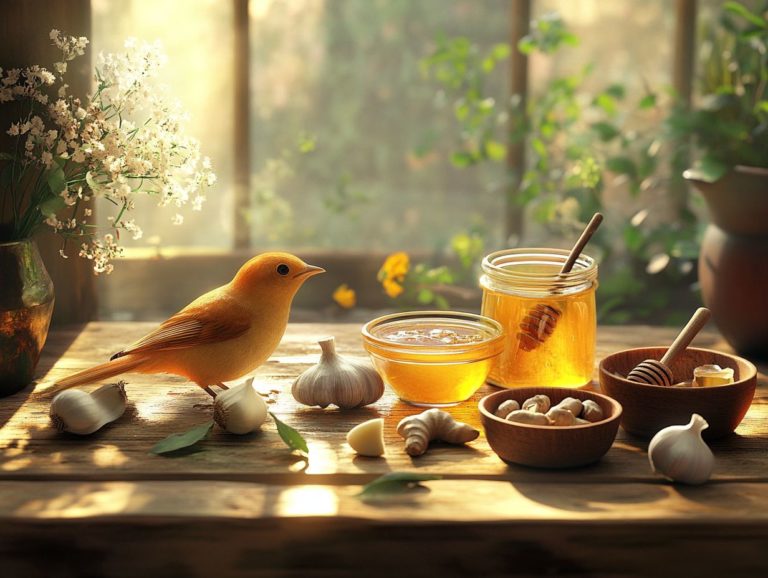Common Toxic Foods for Birds to Avoid
Birds are a source of joy and companionship, but ensuring their health demands your careful attention to their diet. Many common foods that seem harmless to you can actually be toxic to your feathered friends.
This article delves into the most toxic foods you should avoid. It helps you recognize signs of toxicity and offers effective prevention strategies, especially concerning pet birds’ dietary needs. You’ll also find treatment options if your pet birds accidentally ingest something harmful, along with suggestions for safe, nutritious alternatives to keep them happy and healthy.
Discover these vital tips to keep your birds safe and thriving!
Contents
- Key Takeaways:
- Toxic Foods for Birds
- Signs of Toxicity in Birds
- Preventing Toxicity in Birds
- Treatment for Toxicity in Birds
- Safe and Healthy Alternatives for Birds
- Frequently Asked Questions
- Worried about what your feathered friend can eat?
- What are some common toxic foods for birds to avoid?
- Why are these foods toxic for birds?
- Can birds eat small amounts of these foods?
- Are there any other foods that birds should avoid?
- What should I do if my bird accidentally eats a toxic food?
- How can I prevent my bird from eating toxic foods?
Key Takeaways:
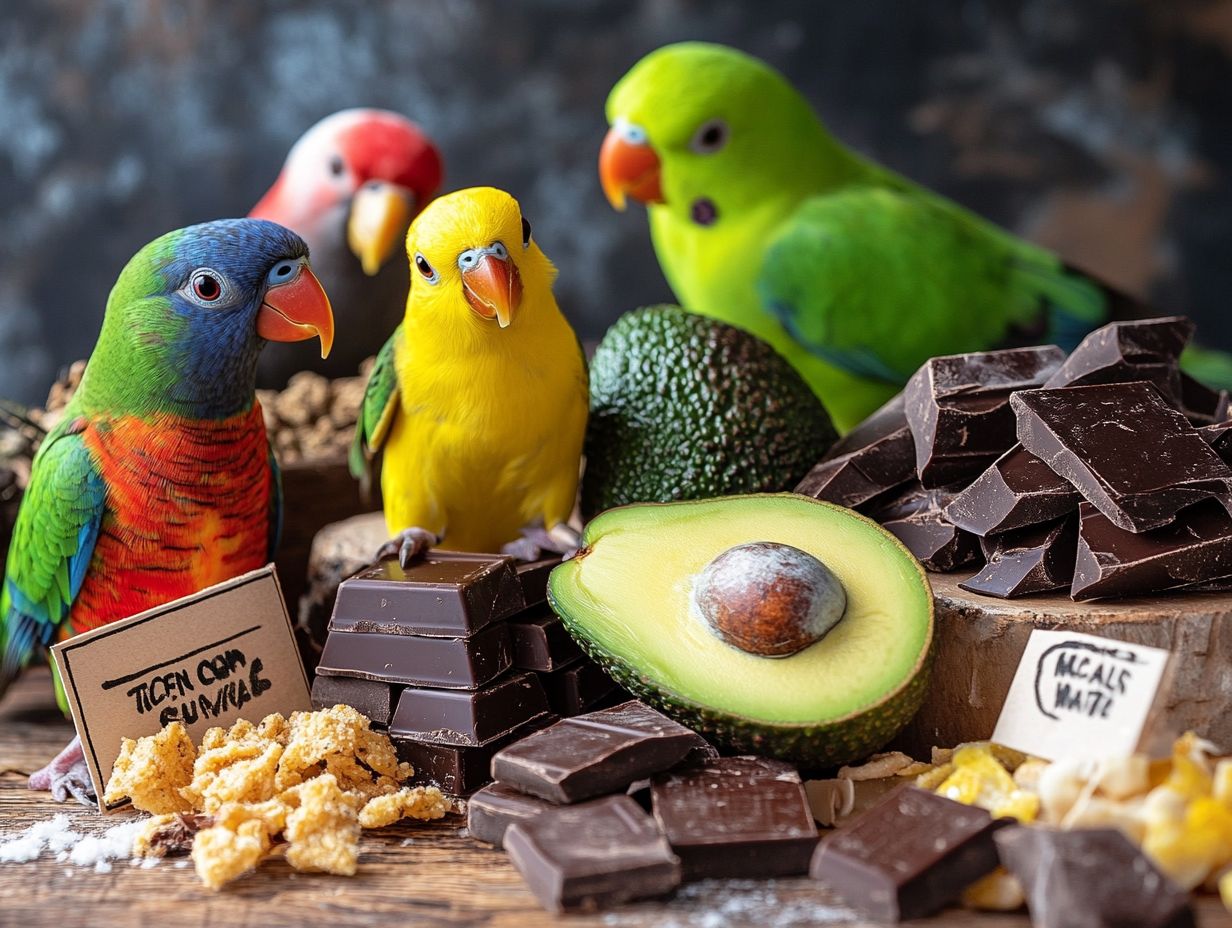
- Avoid feeding birds toxic foods such as avocado, caffeine, chocolate, and high-fat foods to prevent potential health hazards.
- Be vigilant in identifying signs of toxicity in birds, including excessive energy, lethargy, vomiting, diarrhea, respiratory distress, and seizures. Seek immediate treatment to prevent further harm.
- Follow safe feeding guidelines and offer nutritious alternatives, such as healthy treats, to maintain a balanced diet for your feathered friends, promoting their overall health and well-being.
Toxic Foods for Birds
Toxic foods present a considerable risk to your pet birds. They can lead to serious health complications such as heart damage, respiratory issues, and even sudden death for species like budgies and Amazon parrots. It s vital to recognize which foods can be harmful, as many common kitchen staples pose significant dangers.
Foods like avocado, caffeine, chocolate, and xylitol can adversely affect a bird s health. They may cause excessive energy, severe liver damage, or even heart disease. Steering clear of these toxic foods is crucial for ensuring the well-being of your feathered companions.
Overview of Commonly Toxic Foods
Understanding commonly toxic foods for pet birds is essential for their health and well-being. Many household items, like chocolate, caffeine, and avocado, are particularly harmful.
Onions and garlic can lead to severe health issues. Additionally, fruit seeds and fruit pits may contain cyanide, presenting a fatal risk. As a responsible pet owner, being aware of these toxic foods enables you to take proactive measures to protect your beloved pet birds.
Ingesting these toxic foods can affect your pet birds’ delicate systems. For instance, chocolate contains theobromine, which can lead to heart problems and even sudden death. Caffeine, found in coffee and some teas, stimulates the nervous system, causing restlessness, rapid heartbeat, and potential seizures in sensitive pet birds. Avocado contains persin, a toxin that can damage birds hearts and respiratory systems. Onions and garlic can cause oxidative damage to red blood cells, leading to anemia.
By being aware of these dangers, you can create a safer environment for your pet birds, ensuring they lead healthier, happier lives with proper hydration and nutrition.
Signs of Toxicity in Birds
Recognizing the signs of toxicity in your pet birds is crucial. Symptoms can manifest in various ways, from subtle changes in behavior to severe reactions that could signal health issues.
If you notice excessive energy, lethargy, or even sudden death, those may be alarming signs that something is wrong. It’s vital to remain vigilant while observing your birds for any unusual symptoms.
Early detection can dramatically enhance the likelihood of recovery and help prevent serious health complications down the line.
In conclusion, keeping your birds safe involves understanding the risks associated with certain foods. If you suspect your pet bird has ingested something toxic, consult a veterinarian immediately. Your awareness and care can help ensure a long and healthy life for your feathered friends.
Identifying Symptoms and Reactions
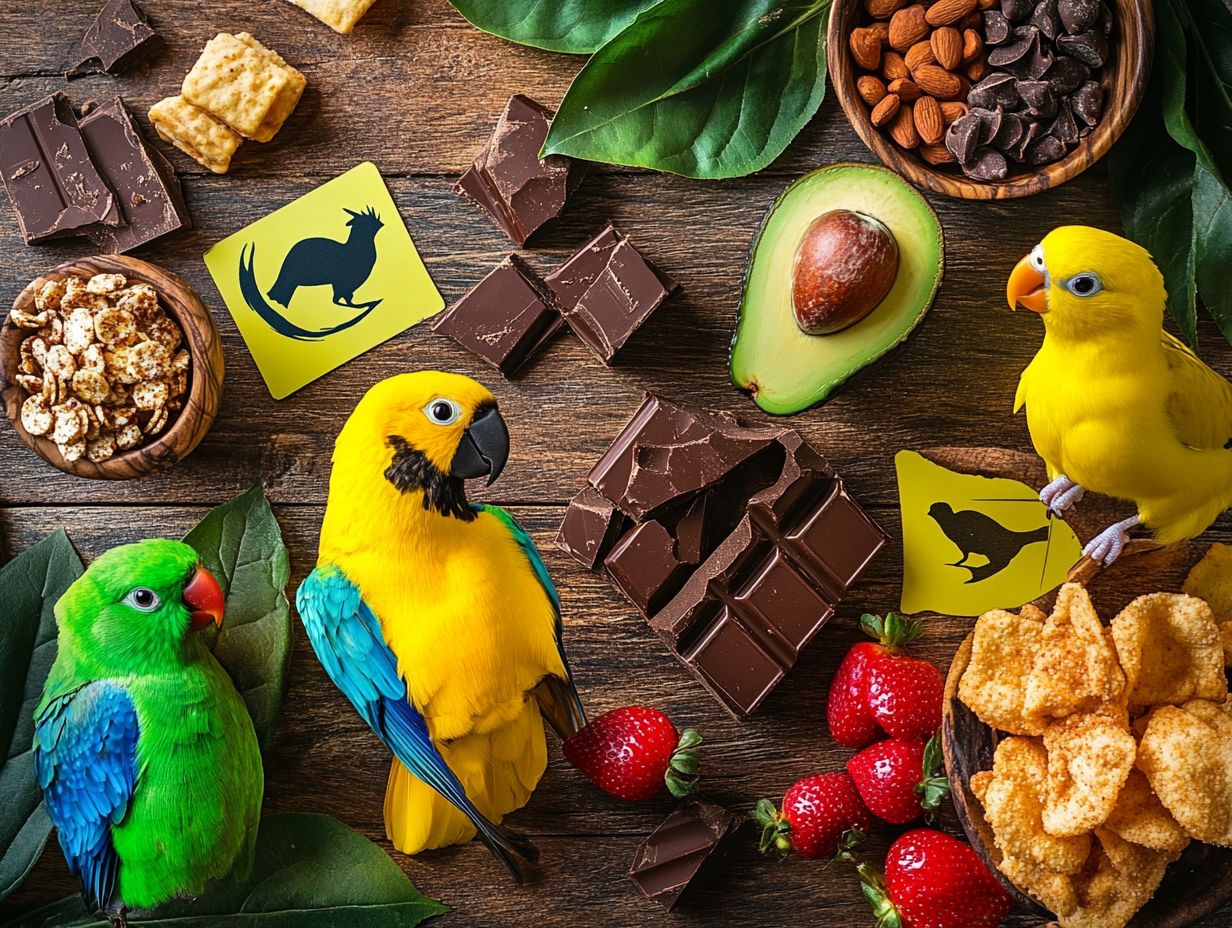
Identifying toxicity in your pet birds is essential. It can be challenging, but it s key for responsible pet ownership. Look out for signs such as difficulty breathing, unusual hyperactivity, or changes in eating and grooming habits these can all point to potential toxicity from harmful substances.
Recognizing these signs early is crucial. They may signal serious issues like heart damage or respiratory distress that require immediate veterinary care. By understanding these symptoms, you enable yourself to respond swiftly and effectively to your bird’s needs.
Watch for changes in vocalization; excessive squawking or a sudden lack of sound can indicate distress. Also, pay attention to any alterations in your pet birds droppings. Unusual color or consistency may suggest stomach problems from toxic foods.
Lethargy is another important sign. If your bird seems unusually tired or disinterested in its typical activities, your bird could be in serious trouble! Being well-informed about these signs can dramatically improve the chances of a successful recovery, ensuring that your beloved pet receives timely intervention when it matters most.
Preventing Toxicity in Birds
Preventing toxicity in birds, especially in pet birds, is crucial for ensuring their health and longevity. The essence of safeguarding your pet lies in understanding their dietary needs and offering safe feeding options.
Stay vigilant about harmful foods like avocado, caffeine, and high-fat foods. All of these can lead to serious health complications in your pet birds. By consulting with a veterinarian and emphasizing healthy treat options, you can craft a balanced diet that minimizes the risk of toxicity and maximizes your pet birds’ overall well-being.
Guidelines for Safe Feeding
Guidelines for safely feeding pet birds are crucial for maintaining their health and preventing toxicity. As a pet owner, it s imperative to create a diet that meets your pet birds unique needs, ensuring they receive both nutritious and safe options while avoiding toxic ingredients like salt.
Provide a balanced blend of seeds, pellets, fresh fruits, and vegetables. Be cautious of common pitfalls like avocados or chocolate, which can be detrimental to their health. Offering treats appropriate for their species satisfies their taste buds and enhances their overall wellbeing.
Regular consultations with a qualified veterinarian are essential, ensuring that your pet birds specific nutritional needs are met effectively. Ultimately, prioritizing these safe feeding practices will lead to happier, healthier avian companions and prevent issues related to heart disease or respiratory difficulties.
Treatment for Toxicity in Birds
When treating toxicity in birds, immediate action is essential. This often necessitates a blend of first aid and medical interventions to mitigate the effects of harmful toxins. If your pet bird exhibits signs of toxicity like respiratory distress or unusual hyperactivity it’s vital to consult a veterinarian without delay.
In some scenarios, you might need to provide first aid at home while getting ready for that vet visit. Keeping your bird hydrated is key. Understanding the urgency of the situation can greatly influence your bird’s recovery journey.
First Aid and Medical Interventions
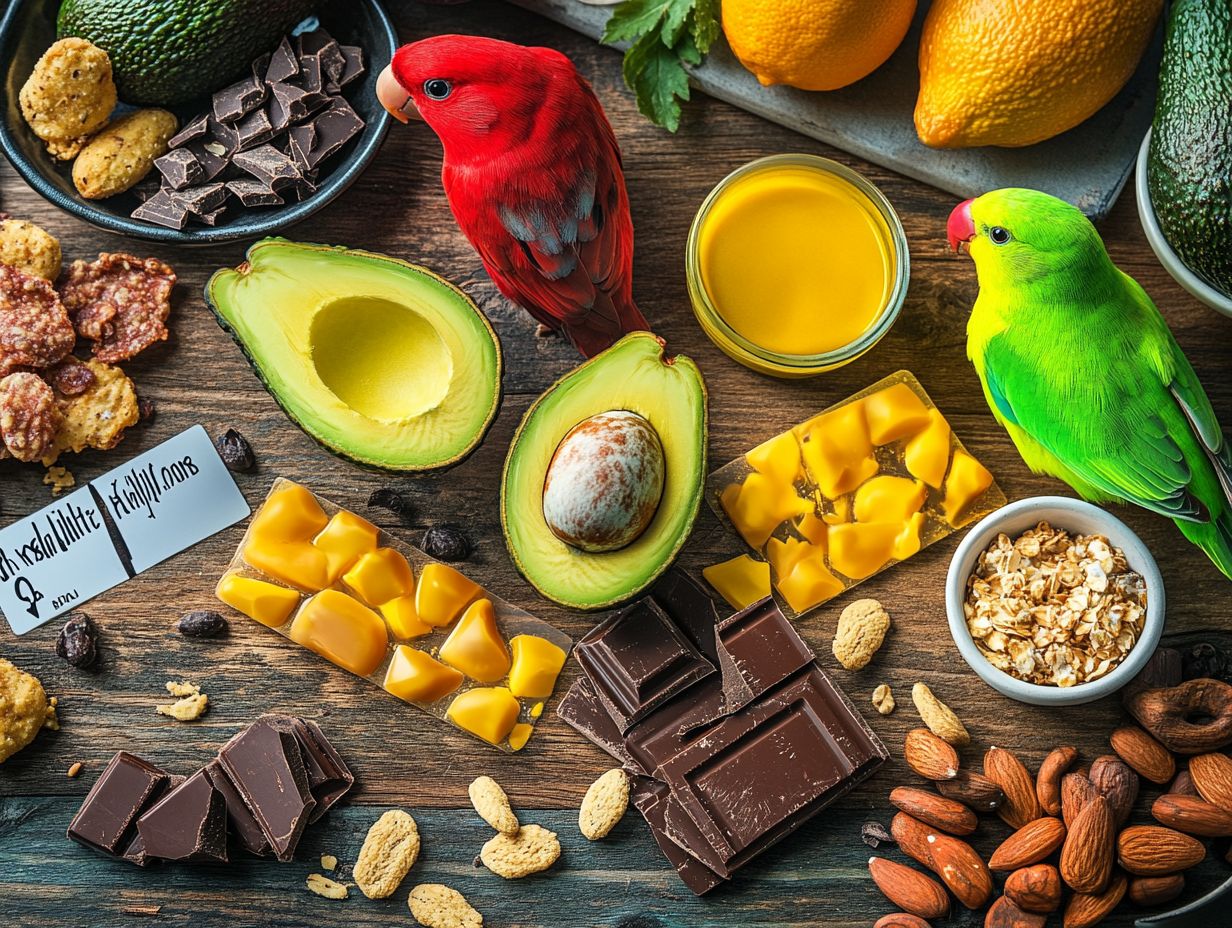
First aid and medical interventions are essential when it comes to addressing toxicity in pet birds. Act quickly to protect your pet’s life! Remove the harmful substance and create a safe, calm environment to reduce stress.
Once you’ve taken these initial steps, seek professional guidance from a veterinarian to determine the necessary medical interventions. Your timely response can significantly enhance the chances of recovery and minimize the risk of long-term health issues.
Recognizing signs of distress, such as lethargy, excessive drooling, or difficulty breathing, enables you to make quick decisions that alleviate your pet bird’s suffering. Basic first aid might involve flushing your pet bird’s mouth with water if it has ingested a toxin or confining it to a quiet space.
Veterinary care may include administering activated charcoal, a substance that helps absorb toxins, providing intravenous fluids for hydration, or specific antidotes tailored to the particular poison involved. Early medical intervention is crucial; many toxic substances can cause irreparable damage if not treated promptly!
Safe and Healthy Alternatives for Birds
Providing safe and healthy alternatives for pet birds is crucial to fulfilling their dietary needs. Instead of toxic foods like avocado and chocolate, choose natural diets that include fresh fruits, vegetables, and specially formulated bird pellets.
These healthy foods meet your pet birds’ nutritional requirements and enhance their overall well-being, making it easier to maintain a balanced diet for your avian companions.
Nutritious Options for a Balanced Diet
Nutritious options are vital for keeping your pet birds healthy and happy. Avoid toxic foods like salt and fat. Select bird-safe fruits and vegetables such as carrots, bell peppers, and leafy greens to create a diverse diet that promotes better health.
Including healthy treats like seeds, nuts, and specially formulated pellets designed for specific bird species ensures they receive essential nutrients without the risk of toxicity. These choices satisfy their hunger and promote long-term health.
It’s crucial to incorporate foods rich in vitamins and minerals to support their immune systems. For example, dark leafy greens like kale and spinach provide essential calcium and iron, vital for bone health and oxygen transport.
Similarly, fruits like blueberries and apples deliver antioxidants that combat cellular damage. Adding whole grains like quinoa provides extra protein and fiber, aiding digestion. By curating their diet with variety, your pet birds can thrive and showcase their vibrant health and well-being.
Watch this informative video to learn more about keeping your pet birds safe and healthy!
Frequently Asked Questions
Worried about what your feathered friend can eat?
What are some common toxic foods for birds to avoid?
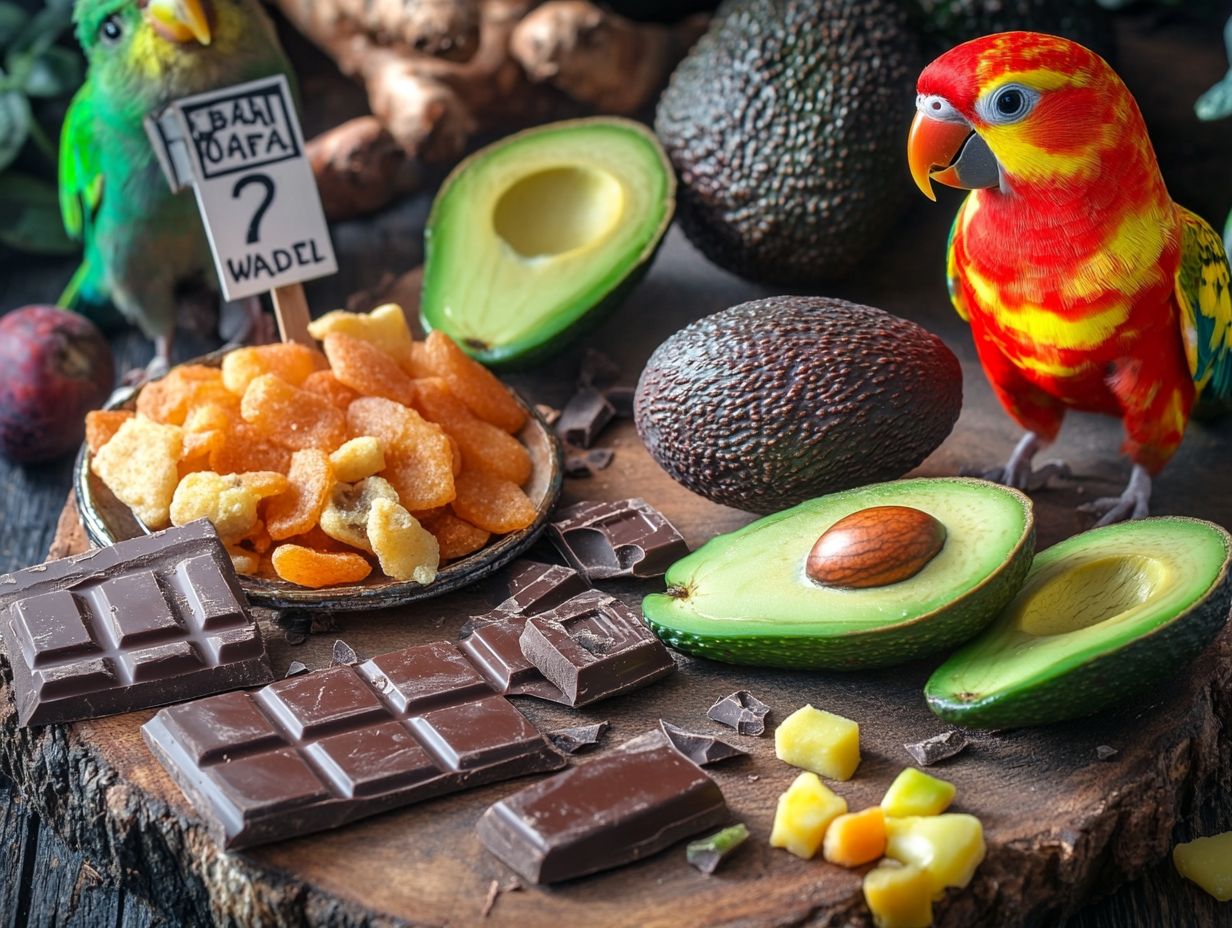
Some common toxic foods for birds to avoid are chocolate, caffeine, avocado, garlic, onion, and apple seeds.
Why are these foods toxic for birds?
These foods contain substances that can be harmful to birds, such as theobromine in chocolate and persin in avocado.
Can birds eat small amounts of these foods?
No, even small amounts of these toxic foods can be harmful to birds and should be avoided completely.
Are there any other foods that birds should avoid?
Yes, other foods that can be toxic to birds include alcohol, salty foods, and foods high in fat or sugar.
What should I do if my bird accidentally eats a toxic food?
If your bird has ingested a toxic food, seek immediate veterinary care. The vet may induce vomiting or provide supportive care to help your bird recover.
We encourage you to share your experiences with pet birds or check out our related articles for more information!
How can I prevent my bird from eating toxic foods?
Keep your bird away from areas where harmful foods might be found.
It’s crucial to learn which foods are safe and which can be dangerous.


